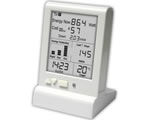 Go to main content
Go to main content
Archive Website of the UK government
Please note that this website has a UK government accesskeys system.
Main menu
Page menu
Environment and greener living

Saving electricity with a home energy monitor

A home energy monitor is an easy way to see how much electricity you’re using - as you use it - and what it costs. People who fit home energy monitors often find their energy use drops by five to 15 per cent in the first year of using them.
What is a home energy monitor?

A home energy monitor helps you see how much electricity you are using at a given time
A home energy monitor is an electronic device that helps you see how much electricity you are using at a given time. It is also known as a 'real time display' or 'RTD'.
A clip from the monitor is attached to the cable from your electricity meter. The current is then measured and transmitted wirelessly to a display that you can keep anywhere in your house.
A monitor isn’t a substitute for your electricity bill. However, it can provide a good indication of how much your electricity is costing if you update the monitor with any changes to your tariff.
How much electricity can I save?
In small-scale trials of home energy monitors, customers have typically saved five to 15 per cent in the first year of owning a monitor, which could be £25 to £75 off a £500 bill.
The Energy Saving Trust estimates that households in the UK waste around 8 per cent of their electricity bill on standby power. That’s about £40 a year for an average household. In addition, £170 million a year is wasted through leaving lights on in unused rooms.
How do I get one and what do they cost?
Some energy suppliers provide free monitors with selected tariffs
Some energy suppliers provide free monitors with selected tariffs; ask your supplier for more information. Otherwise there are a number of retailers selling monitors with different functions from £30 to over £100. You can find a retailer by searching online for ‘home energy monitor’.
Comparing your energy use with others
Some websites collect information about people's energy usage, letting you see how much gas and electricity you use compared to other, similar homes. You'll need to input readings from your energy bills, meters or an electricity monitor.
On some websites, users share tips on how they’ve reduced their energy use.
Imeasure and EnergyAverage are two examples of energy comparison websites. Imeasure is run by the University of Oxford’s Environmental Change Institute. It uses the data that it collects to help its research into reducing emissions from houses and offices.
Help with electricity bills for people with sight problems
If you are registered blind or have a visual impairment you may be able to claim an annual grant towards your electricity and telephone bills.
You must apply for the grant through one of the following:
- a social worker who knows you well
- rehabilitation officer
- Citizens Advice Bureau
- an employee or official from a local office for the blind
You can find more information and an application form on the annual grant from the Royal Blind Society website. They also have details of other one-off grants towards the cost of computer software and equipment, holidays and gadgets to help reading and writing.
The wider issue

Making your home energy efficient could save you on average £250 a year
The energy consumed in homes is responsible for over a quarter of all UK emissions of carbon dioxide, the main greenhouse gas causing climate change. Using energy more efficiently and cutting out wastage will reduce carbon emissions as well as your fuel bills. What's more, making your home as energy efficient as possible could save you on average £250 a year.
More useful links
Useful contacts
Was this information useful?
Why are we asking for this information?
- we want to hear what you think about the quality and usefulness of our pages
- your comments will help us improve our pages
- your comments will also help with the future development of Cross & Stitch
- telling us what you think will help make sure we give you the very best service
 Facebook
Facebook Twitter
Twitter Google Buzz
Google Buzz StumbleUpon
StumbleUpon Delicious
Delicious Reddit
Reddit